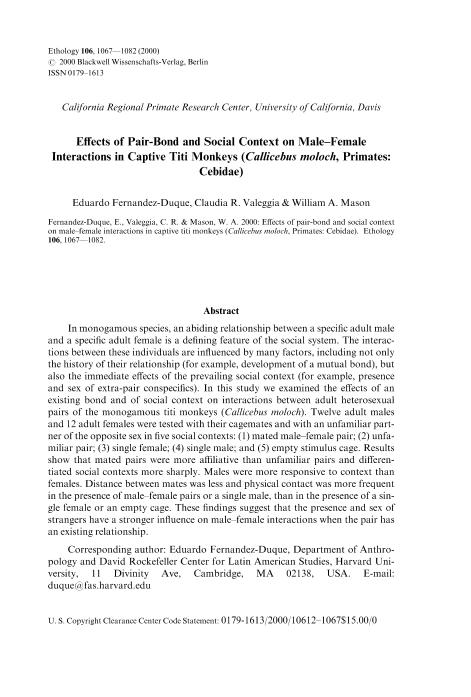Artículo
Effects of Pair-Bond and Social Context on Male-Female Interactions in Captive Titi Monkeys (Callicebus moloch, Primates: Cebidae)
Fecha de publicación:
01/2000
Editorial:
Wiley Blackwell Publishing, Inc
Revista:
Ethology
ISSN:
0179-1613
Idioma:
Inglés
Tipo de recurso:
Artículo publicado
Clasificación temática:
Resumen
In monogamous species, an abiding relationship between a specific adult male and a specific adult female is a defining feature of the social system. The interactions between these individuals are influenced by many factors, including not only the history of their relationship (for example, development of a mutual bond), but also the immediate effects of the prevailing social context (for example, presence and sex of extra‐pair conspecifics). In this study we examined the effects of an existing bond and of social context on interactions between adult heterosexual pairs of the monogamous titi monkeys (Callicebus moloch). Twelve adult males and 12 adult females were tested with their cagemates and with an unfamiliar partner of the opposite sex in five social contexts: (1) mated male–female pair; (2) unfamiliar pair; (3) single female; (4) single male; and (5) empty stimulus cage. Results show that mated pairs were more affiliative than unfamiliar pairs and differentiated social contexts more sharply. Males were more responsive to context than females. Distance between mates was less and physical contact was more frequent in the presence of male–female pairs or a single male, than in the presence of a single female or an empty cage. These findings suggest that the presence and sex of strangers have a stronger influence on male–female interactions when the pair has an existing relationship
Palabras clave:
Callicebus
,
Pair Bond
Archivos asociados
Licencia
Identificadores
Colecciones
Articulos(CECOAL)
Articulos de CENTRO DE ECOLOGIA APLICADA DEL LITORAL (I)
Articulos de CENTRO DE ECOLOGIA APLICADA DEL LITORAL (I)
Citación
Fernandez Duque, Eduardo; Valeggia, Claudia Rita; Mason, Wiliam A.; Effects of Pair-Bond and Social Context on Male-Female Interactions in Captive Titi Monkeys (Callicebus moloch, Primates: Cebidae); Wiley Blackwell Publishing, Inc; Ethology; 106; 1-2000; 1067-1082
Compartir
Altmétricas




